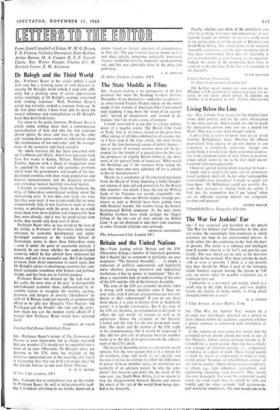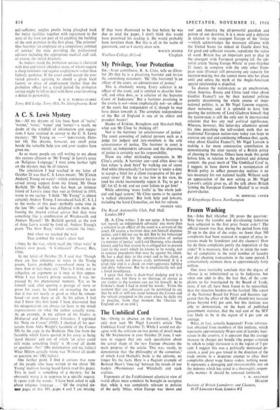Sis,—`The War for Jenkins' Ear,' written by a prisoner, was
refreshingly practical on a subject so often limited within the academic argument whether a prison sentence is concerned with retribution or reform.
If the sentence in most cases was simply that the convicted person should attend and work in one of Her Majesty's labour centres (perhaps known as 'X' Limited) for a stated period, then one has a totally new concept of criminal custody, i.e., compulsory attendance at a place of work. Those found unable to work by reason of impairment of mind or body would attend 'hospitals or rehabilitation centres' of one sort or another. These labour centres would vary in object, e.g., light industrial, agricultural, civil engineering (including road projects). They would also vary in security. For some 'the employees' would board out (and could thus he joined by wife and family) and for other residents 'staff accommoda- tion' would be compulsory. The unit would aim to be
self-sufficient, surplus profits being ploughed back for better facilities together with repayment to the state of the loan (or part of it) enabling the building of the unit premises in the first place. 'The prisoner' thus becomes 'an employee on a compulsory contract of service,' the state providing the professional advisers including the appropriate medical staff and, of course, the initial directors.
As matters stand the probation service is cluttered with first and trivial offenders many of whom require a sharp reminder and regular employment rather than fatherly guidance. If the court could accept the con- victed person's agreeing to attend a given local factory or place of employment (rather than the probation office) for a stated period the probation service might be left to deal with those cases involving a defect in personality.
R. T. F. TURRALL-CLARKE Torry Hill Lodge, Tarry Hill, Nr. Siziiizgbourne, Kent







































 Previous page
Previous page